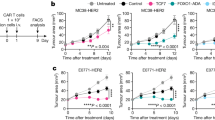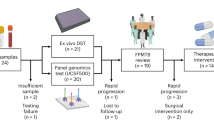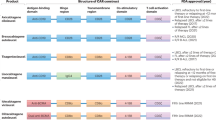Abstract
Activating mutations in the NOTCH1 pathway are frequent in pediatric T-cell acute lymphoblastic leukemia (T-ALL) but their role in refining risk stratification is unclear. We screened 162 pediatric T-ALL patients treated on the MRC UKALL2003 trial for NOTCH1/FBXW7 gene mutations and related genotype to response to therapy and long-term outcome. Overall, 35% were wild-type (WT) for both genes (NOTCH1WTFBXW7WT), 38% single NOTCH1 mutant (NOTCH1SingleFBXW7WT), 3% just FBXW7 mutant (NOTCH1WTFBXW7MUT) and 24% either double NOTCH1 mutant (NOTCH1DoubleFBXW7WT) or mutant in both genes (NOTCH1MUTFBXW7MUT), hereafter called as NOTCH1±FBXW7Double. There was no difference between groups in early response to therapy, but NOTCH1±FBXW7Double patients were more likely to be associated with negative minimal residual disease (MRD) post-induction than NOTCH1WTFBXW7WT patients (71% versus 40%, P=0.004). Outcome improved according to the number of mutations, overall survival at 5 years 82%, 88% and 100% for NOTCH1WTFBXW7WT, NOTCH1SingleFBXW7WT and NOTCH1±FBXW7Double patients, respectively (log-rank P for trend=0.005). Although 14 NOTCH1±FBXW7Double patients were classified as high risk (slow response and/or MRD positive), only two had disease progression and all remain alive. Patients with double NOTCH1 and/or FBXW7 mutations have a very good outcome and should not be considered for more intensive therapy in first remission, even if slow early responders or MRD positive after induction therapy.
This is a preview of subscription content, access via your institution
Access options
Subscribe to this journal
Receive 12 print issues and online access
$259.00 per year
only $21.58 per issue
Buy this article
- Purchase on Springer Link
- Instant access to full article PDF
Prices may be subject to local taxes which are calculated during checkout



Similar content being viewed by others
References
Herold R, von Stackelberg A, Hartmann R, Eisenreich B, Henze G . Acute lymphoblastic leukemia-relapse study of the Berlin-Frankfurt-Munster Group (ALL-REZ BFM) experience: early treatment intensity makes the difference. J Clin Oncol 2004; 22: 569–570.
Pui CH, Evans WE . Treatment of acute lymphoblastic leukemia. New Engl J Med 2006; 354: 166–178.
Paganin M, Ferrando A . Molecular pathogenesis and targeted therapies for NOTCH1-induced T-cell acute lymphoblastic leukemia. Blood Rev 2011; 25: 83–90.
Koch U, Radtke F . Notch in T-ALL: new players in a complex disease. Trends Immunol 2011; 32: 434–442.
Hansson EM, Lendahl U, Chapman G . Notch signaling in development and disease. Semin Cancer Biol 2004; 14: 320–328.
Mumm JS, Kopan R . Notch signaling: from the outside in. Dev Biol 2000; 228: 151–165.
Weng AP, Ferrando AA, Lee W, Morris JP, Silverman LB, Sanchez-Irizarry C et al. Activating mutations of NOTCH1 in human T cell acute lymphoblastic leukemia. Science 2004; 306: 269–271.
Zuurbier L, Homminga I, Calvert V, te Winkel ML, Buijis-Gladdines JG, Kooi C et al. NOTCH1 and/or FBXW7 mutations predict for initial good prednisone response but not for improved outcome in pediatric T-cell acute lymphoblastic leukemia patients treated on DCOG or COALL protocols. Leukemia 2010; 24: 2014–2022.
Breit S, Stanulla M, Flohr T, Schrappe M, Ludwig WD, Tolle G et al. Activating NOTCH1 mutations predict favorable early treatment response and long-term outcome in childhood precursor T-cell lymphoblastic leukemia. Blood 2006; 108: 1151–1157.
Clappier E, Collette S, Grardel N, Girard S, Suarez L, Brunie G et al. NOTCH1 and FBXW7 mutations have a favorable impact on early response to treatment, but not on outcome, in children with T-cell acute lymphoblastic leukemia (T-ALL) treated on EORTC trials 58881 and 58951. Leukemia 2010; 24: 2023–2031.
Park MJ, Taki T, Oda M, Watanabe T, Yumura-Yagu K, Kobayashi R et al. FBXW7 and NOTCH1 mutations in childhood T cell acute lymphoblastic leukaemia and T cell non-Hodgkin lymphoma. Br J Haematol 2009; 145: 198–206.
Mansur MB, Hassan R, Barbosa TC, Splendore A, Jotta PY, Yunes JA et al. Impact of complex NOTCH1 mutations on survival in paediatric T-cell leukaemia. BMC Cancer 2012; 12: 9.
Sanchez-Irizarry C, Carpenter AC, Weng AP, Pear WS, Aster JC, Blacklow SC . Notch subunit heterodimerization and prevention of ligand-independent proteolytic activation depend, respectively, on a novel domain and the LNR repeats. Mol Cell Biol 2004; 24: 9265–9273.
Gupta-Rossi N, Le Bail O, Gonen H, Brou C, Logeat F, Six E et al. Functional interaction between SEL-10, an F-box protein, and the nuclear form of activated Notch1 receptor. J Biol Chem 2001; 276: 34371–34378.
Sulis ML, Williams O, Palomero T, Tosello V, Pallikuppam S, Real PJ et al. NOTCH1 extracellular juxtamembrane expansion mutations in T-ALL. Blood 2008; 112: 733–740.
Gordon WR, Roy M, Vardar-Ulu D, Garfinkel M, Mansour MJ, Aster JC et al. Structure of the Notch1-negative regulatory region: implications for normal activation and pathogenic signaling in T-ALL. Blood 2009; 113: 4381–4390.
Chiang MY, Xu L, Shestova O, Histen G, L’Heureux S, Romany C et al. Leukemia-associated NOTCH1 alleles are weak tumor initiators but accelerate K-ras-initiated leukemia. J Clin Invest 2008; 118: 3181–3194.
Malyukova A, Dohda T, von der Lehr N, Akhoondi S, Corcoran M, Heyman M et al. The tumor suppressor gene hCDC4 is frequently mutated in human T-cell acute lymphoblastic leukemia with functional consequences for Notch signaling. Cancer Res 2007; 67: 5611–5616.
Thompson BJ, Buonamici S, Sulis ML, Palomero T, Vilimas T, Basso G et al. The SCFFBW7 ubiquitin ligase complex as a tumor suppressor in T cell leukemia. J Exp Med 2007; 204: 1825–1835.
Kox C, Zimmermann M, Stanulla M, Leible S, Schrappe M, Ludwig WD et al. The favorable effect of activating NOTCH1 receptor mutations on long-term outcome in T-ALL patients treated on the ALL-BFM 2000 protocol can be separated from FBXW7 loss of function. Leukemia 2010; 24: 2005–2013.
O’Neil J, Grim J, Strack P, Rao S, Tibbitts D, Winter C et al. FBW7 mutations in leukemic cells mediate NOTCH pathway activation and resistance to gamma-secretase inhibitors. J Exp Med 2007; 204: 1813–1824.
Jen KY, Song IY, Banta KL, Wu D, Mao JH, Balmain A . Sequential mutations in Notch1, Fbxw7, and Tp53 in radiation-induced mouse thymic lymphomas. Blood 2012; 119: 805–809.
Maser RS, Choudhury B, Campbell PJ, Feng B, Wong KK, Protopopov A et al. Chromosomally unstable mouse tumours have genomic alterations similar to diverse human cancers. Nature 2007; 447: 966–971.
Erbilgin Y, Sayitoglu M, Hatirnaz O, Dogru O, Akcay A, Tuysuz G et al. Prognostic significance of NOTCH1 and FBXW7 mutations in pediatric T-ALL. Dis Markers 2010; 28: 353–360.
Qureshi A, Mitchell C, Richards S, Vora A, Goulden N . Asparaginase-related venous thrombosis in UKALL 2003- re-exposure to asparaginase is feasible and safe. Br J Haematol 2010; 149: 410–413.
Goulden NJ, Knechtli CJ, Garland RJ, Langlands K, Hancock JP, Potter MN et al. Minimal residual disease analysis for the prediction of relapse in children with standard-risk acute lymphoblastic leukaemia. Br J Haematol 1998; 100: 235–244.
Ferrando A . NOTCH mutations as prognostic markers in T-ALL. Leukemia 2010; 24: 2003–2004.
Remke M, Pfister S, Kox C, Toedt G, Becker N, Benner A et al. High-resolution genomic profiling of childhood T-ALL reveals frequent copy-number alterations affecting the TGF-beta and PI3K-AKT pathways and deletions at 6q15-16.1 as a genomic marker for unfavorable early treatment response. Blood 2009; 114: 1053–1062.
Rudner LA, Brown KH, Dobrinski KP, Bradley DF, Garcia MI, Smith AC et al. Shared acquired genomic changes in zebrafish and human T-ALL. Oncogene 2011; 30: 4289–4296.
Zhang J, Ding L, Holmfeldt L, Wu G, Heatley SL, Payne-Turner D et al. The genetic basis of early T-cell precursor acute lymphoblastic leukaemia. Nature 2012; 481: 157–163.
Puente XS, Pinyol M, Quesada V, Conde L, Ordonez GR, Villamor N et al. Whole-genome sequencing identifies recurrent mutations in chronic lymphocytic leukaemia. Nature 2011; 475: 101–105.
Kridel R, Meissner B, Rogic S, Boyle M, Telenius A, Woolcock B et al. Whole transcriptome sequencing reveals recurrent NOTCH1 mutations in mantle cell lymphoma. Blood 2012; 119: 1963–1971.
Fabbri G, Rasi S, Rossi D, Trifonov V, Khiabanian H, Ma J et al. Analysis of the chronic lymphocytic leukemia coding genome: role of NOTCH1 mutational activation. J Exp Med 2011; 208: 1389–1401.
Acknowledgements
We are grateful to the clinical investigators who entered and managed patients in the trial. Primary childhood leukemia samples used in the study were provided by the Leukaemia and Lymphoma Research Childhood Leukaemia Cell Bank working with the laboratory teams in the Bristol Genetics Laboratory, Southmead Hospital, Bristol, UK; Molecular Biology Laboratory, Royal Hospital for Sick Children, Glasgow, UK; Molecular Haematology Laboratory, Royal London Hospital, London, UK; and Molecular Genetics Service and Sheffield Children’s Hospital, Sheffield, UK. This work was supported by Cancer Research UK, UK Leukaemia and Lymphoma Research, and the UK Children’s Cancer and Leukaemia Group, and was undertaken at UCL which receives a proportion of funding from the Department of Health’s NIHR Biomedical Research Centre’s funding scheme.
AUTHOR CONTRIBUTIONS
SJ, KKK and MRM performed experiments; RW and SR analyzed data; REG and DCL designed the study; AV, NG and CM are the trial co-investigators; JH is the trial MRD co-ordinator; AVM provided data; SJ, DCL and REG wrote the manuscript with contributions from other authors as appropriate.
Author information
Authors and Affiliations
Corresponding author
Ethics declarations
Competing interests
The authors declare no conflict of interest.
Additional information
Supplementary Information accompanies the paper on the Leukemia website
Rights and permissions
About this article
Cite this article
Jenkinson, S., Koo, K., Mansour, M. et al. Impact of NOTCH1/FBXW7 mutations on outcome in pediatric T-cell acute lymphoblastic leukemia patients treated on the MRC UKALL 2003 trial. Leukemia 27, 41–47 (2013). https://doi.org/10.1038/leu.2012.176
Received:
Accepted:
Published:
Issue Date:
DOI: https://doi.org/10.1038/leu.2012.176
Keywords
This article is cited by
-
Prognostic value of Oncogenetic mutations in pediatric T Acute Lymphoblastic Leukemia: a comparison of UKALL2003 and FRALLE2000T protocols
Leukemia (2022)
-
Isoform specific FBXW7 mediates NOTCH1 Abruptex mutation C1133Y deregulation in oral squamous cell carcinoma
Cell Death & Disease (2020)
-
Somatic and germline genomics in paediatric acute lymphoblastic leukaemia
Nature Reviews Clinical Oncology (2019)
-
Panel-based next-generation sequencing identifies prognostic and actionable genes in childhood acute lymphoblastic leukemia and is suitable for clinical sequencing
Annals of Hematology (2019)
-
Impact of PTEN abnormalities on outcome in pediatric patients with T-cell acute lymphoblastic leukemia treated on the MRC UKALL2003 trial
Leukemia (2016)



